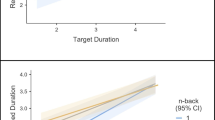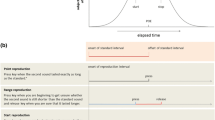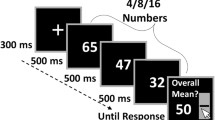Abstract
Recently, random generation of time intervals has been proposed as a procedure to impair executive processing in a dual-task paradigm without substantial interference with phonological and visuo-spatial working memory resources. A fundamental assumption of this procedure is that humans are able to distinguish time sequences on their degree of randomness. The present study tests this assumption. To this end, non-biased, repetition-biased, alternation-biased sequences and repetitive rhythms were judged under conditions of higher or lower executive load. In Exp. 1, load depended on the presentation speed, while in Exp. 2, a dual-task condition was used with either a concurrent number-copying task or an arithmetic task. It was found that the participants could distinguish repetitive rhythms from more or less random sequences, and that both accuracy of this judgment and latency were affected by the concurrent load. The findings are taken as a first indication that random time judgment is capacity-limited.
Similar content being viewed by others
Author information
Authors and Affiliations
Additional information
Received: 9 September 1999 / Accepted: 1 October 1999
Rights and permissions
About this article
Cite this article
Vandierendonck, A. Is judgment of random time intervals biased and capacity-limited?. Psychological Research Psychologische Forschung 63, 199–209 (2000). https://doi.org/10.1007/PL00008179
Issue Date:
DOI: https://doi.org/10.1007/PL00008179




